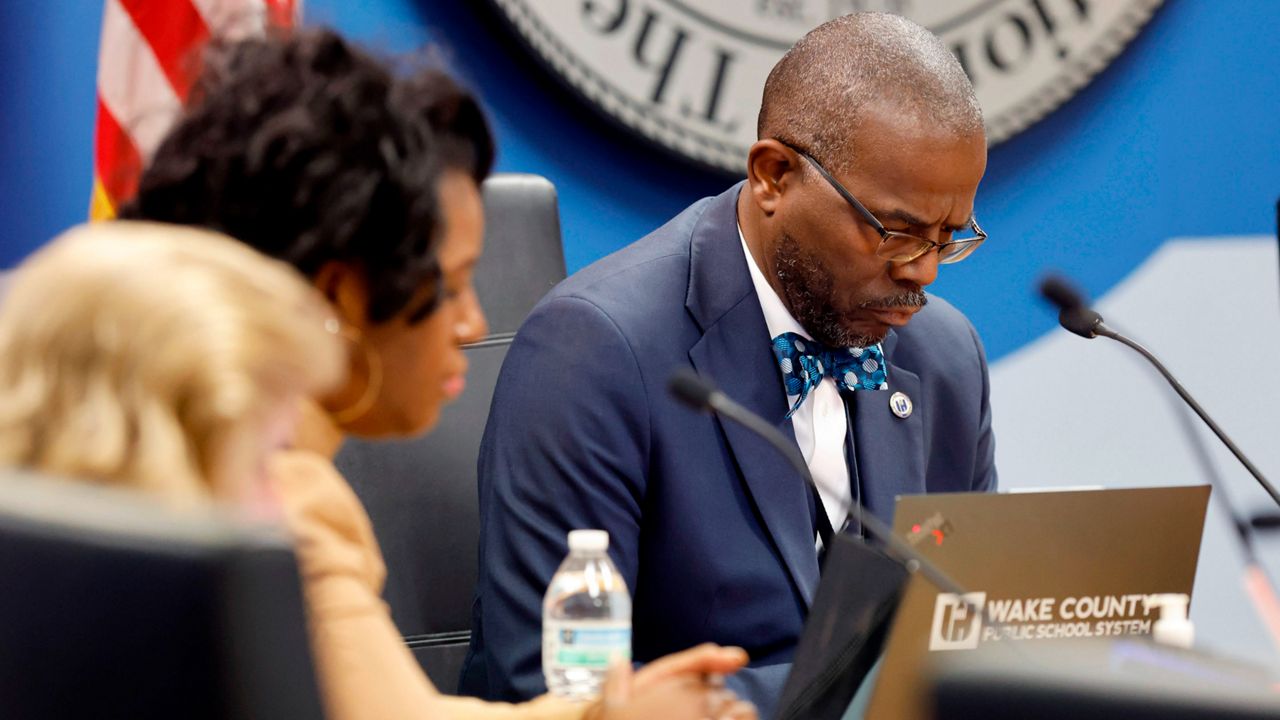NORTH CAROLINA — Getting the right amount of funding to ensure students receive a quality education is a struggle for some North Carolina school systems, who say their budget deficit shows how they fall short of having what's needed.
On April 14, North Carolina lawmakers announced a $32.6 billion state budget that would raise teacher salaries by 3.3% over the next two years. The state is ranked 49th in the country in public school funding, according to a report from the Education Law Center.
Several schools throughout the state, including some of the biggest counties, are running up to millions of dollars in budget deficits.
As of February, the state forecasts revenue growth of just 0.5 % in the next fiscal year and then a decline of 2.4% the year after.
At the beginning of every fiscal year, which runs from July to June, school districts are given a certain amount that they are allowed to spend. It includes state, federal and local funds. A budget deficit is the amount of money that a district spent over the amount of money that they were given to spend.
Of eight school districts that reported having a budget deficit this fiscal year, Wake County Public Schools expects to have the highest deficit at $60 million, according to a district spokesperson. Not all districts are experiencing a budget deficit, but the funding isn’t as high as it should be to support quality education for students, school officials say.
Spectrum News 1 reached out to all 115 school districts in North Carolina. Of those that responded, eight report budget deficits for the current school year.
Districts that reported budget deficits for the current fiscal year:
- Wake County Public Schools: $60 million
- Cabarrus County Schools: $8.6 million
- Durham Public Schools: $7 million
- Winston-Salem/Forsyth County Schools: $5 million
- Iredell-Statesville Schools: $2 million
- Anson County Schools: $1.2 million
- Burke County Public Schools: $544,000
- Mitchell County Schools: $541,000
Total federal, state and local funds allocated to each district for the current fiscal year:
- Wake County Public Schools: $3.3 billion
- Durham Public Schools: $708 million
- Cabarrus County Schools: $545 million
- Iredell-Statesville Schools: $260 million
- Burke County Public Schools: $152 million
- Mitchell County Schools: $63 million
- Anson County Schools: $48 million
- Winston-Salem/Forsyth County Schools: $649 million
Iredell-Statesville Schools is facing difficult budget decisions with a $3 million deficit, according to Superintendent Jeffery James.
"Where we’re at, there’s nowhere to cut back. If we can't get a guaranteed revenue of a 6-8% a year increase, we're going to continuously be here looking at who we're going to cut next or what program," James said.
The district operates on an annual budget of about $260 million.
With around 90% of the budget allocated to salaries and benefits, James said they've exhausted cost-cutting options.
"Your school systems are one of the most important economic tools you have in your community," James said. "Your school systems are one of the most important economic tools you have in your community," James said.
The superintendent also highlighted staffing difficulties, noting that 55% of the teaching staff is nontraditional, meaning they did not complete a teacher education degree program.
The average salary for teachers in North Carolina is about $13,000 below the national average, according to the National Education Association.
"When you're competing for teachers at $41,000, it's really hard in a county where the average household income is $83,000," James said.
Despite advocating for increased annual funding, the Iredell-Statesville Schools Board approved a $3 million budget cut for next fiscal year, the same amount for its deficit this year. It would mean cutting unfilled teaching jobs, reducing central office positions and closing its virtual academy.
The board voted unanimously during a meeting on April 14, after reviewing the plan the week prior. Chief Finance Officer Adam Steele presented the proposed budget, according to the district.
The superintendent also discussed several challenges with inadequate state funding for special education and transportation. It's an issue that schools in Wake County are experiencing.
“We can all recognize that the needs here in Wake County are that we’ve got to get our children so that they are proficient at reading and math, we need to have safety in our schools,” Michelle Morrow said during the public comment period at a recent board meeting with Wake County Public Schools.

Students with special needs are a particular area of concern.
“Those students right now are not being served in the Wake County Public Schools,” Morrow, a former Republican candidate for state superintendent of public instruction, said.
Concerned parents, teachers and community members filled the seats at a board meeting April 8 to discuss the district's budget for next year. In front of them, school board members and the superintendent sat behind a U-shaped table to hear their concerns.
“It's time for us to put our student needs first, and that's where every dollar should be considered first and foremost,” Morrow said.“It's time for us to put our student needs first, and that's where every dollar should be considered first and foremost,” Morrow said.
Another school district experiencing budget concerns is Winston-Salem/Forsyth County Schools, with a budget deficit of $5 million. The district's chief information officer, Amanda Lehmert Killian, gave an update to the school board on March 25, outlining efforts to achieve $8 million in savings as a buffer.
“Any time that there are budgetary issues, that is a cause for concern, because it means that we're going to have to change the way we do things,” Killian said. “The superintendent is very confident about the work that she's done to make sure that we're going to end this year with a balanced budget.”
Killian said that the district is limiting any impacts to schools, prioritizing core instruction and student support services. She said the deficit was caused by rising costs, employee bonuses and the expiration of federal COVID-19 relief funds.

Looking ahead, the district is working with the county board of commissioners to secure additional resources for next year, particularly to support its non-teaching staff. This includes janitors, bus drivers, child nutrition workers and non-licensed teachers. These staff members, according to Killian, typically make lower salaries than licensed teachers.
“We've advocated for them to increase those salaries so we can keep those jobs competitive and fill those very important jobs that are critically important to our kids,” Killian said.
Reports show that “the state is responsible for the bulk of education spending in North Carolina — $10.4 billion out of the total $17.3 billion spent in 2022–23, including federal ($3.0 billion) and local ($3.9 billion) funds,” according to the John Locke Association.
Christina Cole, special education teacher and president of the Wake County chapter of the North Carolina Association of Educators, spoke out against the school board’s proposed budget for the next school year, at the most recent board meeting.
“Which governing bodies can public school staff, students and parents count on in this political moment to be brave and do what's needed?” Cole said. “We certainly know it's not our current federal administration [and] it's certainly not our General Assembly who continues to underfund public education.”
The Wake County district will vote May 6 on the budget for the next fiscal year and submit its proposal to county commissioners on May 15. The vote for the proposed budget is on June 2.
James, the superintendent for Iredell-Statesville Schools, says he hopes that the future is bright for North Carolina schools, as lawmakers decide on education funding for the next few years.
“The industry is growing, that's all occurring because of what we're doing,” James said. “We need you fighting for legislation [and] fighting for money; it's really a lot more important than people realize.”




